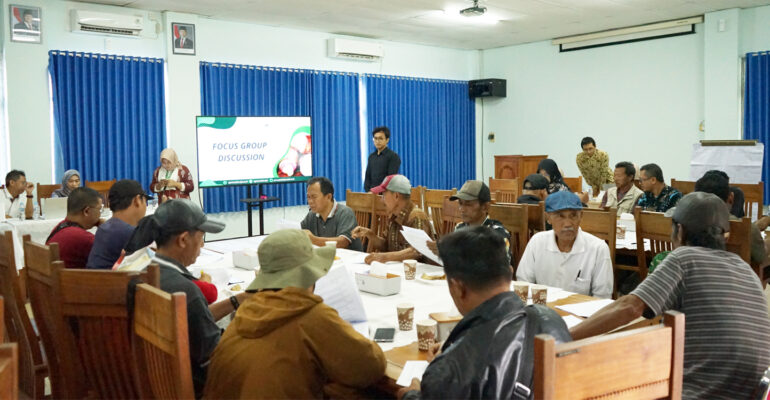DPMA IPB University and PT Agrinesia Hold FGD to Explore the Challenges and Prospects of Taro Development with Farmers

The Directorate of Agromaritime Community Development (DPMA) of IPB University together with PT Agrinesia Raya held a “Focus Group Discussion (FGD) on Taro Cultivation, Challenges, and Prospects for Taro Development” at the Agribusiness and Technology Park (ATP), Bogor (11/12).
This activity aimed to identify challenges, opportunities, and strategies for developing taro agribusiness to be sustainable and able to improve the welfare of farmers.
The event was attended by 35 participants from various farmer groups in the Bogor area, such as Saluyu Farmer Group of Situgede Village, Tirta Maju Farmer Group of Situgede Village, Mekar Sari Farmer Group of Sukaharja Village, Mekar Sejahtera Farmer Group of Cipelang Village, Bumi Pasir Pari Sejahtera Forest Farmer Group of Cianten Village, Cibuntu Tengah Farmer Group of Cicadas Village, Areska Jaya Farmer Group of Gunung Malang Village, Kebun Kopi Mandiri Farmer Group of Cibanteng Village, and Benteng Makmur Farmer Group of Benteng Village.
Nur Fajri Rahmawati, SP as Social Entrepreneurship Supervisor of DPMA IPB University, in her speech emphasized the importance of collaboration between farmers, academics, and industry to build a competitive taro agribusiness ecosystem.
The main speaker, Prof Edi Santosa, also presented material on cultivation techniques, market potential, and challenges faced in taro development in Bogor. The discussion was interactive, with participants sharing experiences and ideas, especially related to technical issues of cultivation, farm management, and market access.
Nanang Siswanto, Marketing Director of PT Agrinesia Raya, expressed his optimism towards the development of Bogor taro agribusiness. PT Agrinesia Raya is a company known for a number of regional souvenir products, one of which is Lapis Bogor Sangkuriang.
“We see great potential in this taro commodity. With proper management, taro can be a superior product that penetrates the national and even international markets. Through Sangkuriang, we are committed to supporting farmers to create quality and competitive products,” he said.
Meanwhile, Abidin, a taro farmer from Poktan Mekar Sari, revealed that this activity provided many benefits for farmers. “We feel helped by this discussion. The support from IPB University and PT Agrinesia Raya makes us optimistic to develop our taro farming business,” he said.
The results of the discussion will be documented as strategic recommendations for taro agribusiness development. Through collaboration involving farmers, academics and industry, this activity is expected to be a concrete step in overcoming the challenges of taro cultivation while capitalizing on market opportunities.
With the right strategy, Bogor taro is expected to become one of the mainstay commodities capable of driving regional economic growth in a sustainable manner. (*/Rz) (IAAS/HLF)



